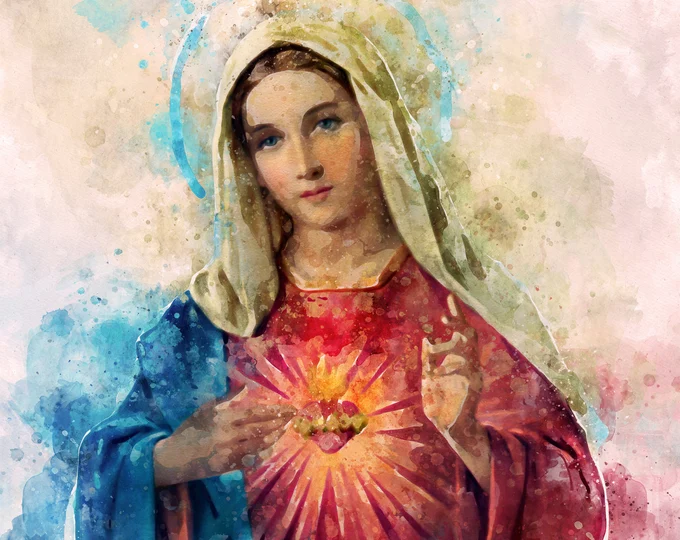Church Fathers on Mary as Ark of the New Covenant St. Proclus (died 446 or 447) “Let the woman haste hither, for the woman shows not the tree of death, but brings forth the tree of life: the virgins...the mothers also, for the Virgin Mother has amended the tree of disobedience by the tree of life. The female …
Church Fathers on Mary as Ark of the New Covenant
St. Proclus (died 446 or 447)
“Let the woman haste hither, for the woman shows not the tree of death, but brings forth the tree of life: the virgins…the mothers also, for the Virgin Mother has amended the tree of disobedience by the tree of life. The female sex is no longer in execration, for it has obtained whereby it shall surpass even the angels in glory. Eve has been healed…and Mary is venerated (adored), because she has become mother and handmaid, cloud and chamber, and ark of the Lord….For this cause let us say to her: Blessed art thou amongst women, who alone hast healed the grief of Eve; who alone hast borne the world’s price” (Orat.iv.and v. In Natal. Dom. P.G. Tom. 65, p.710) (Blessed Virgin, p. 58).
St. Ephrem (c. 306-373)
“With the rib that was drawn out of Adam, the wicked one drew out the heart of Adam. There arose from the rib [i.e., Mary], a hidden power which cut off Satan as Dagon. For in that ark [Mary again], a book was hidden that cried and proclaimed the Conqueror. There was then a mystery revealed, in that Dagon was brought low in his own place of refuge. The accomplishment came after the type, in that the wicked one was brought low wherein he trusted….Fulfilled was the mystery. Blessed is He who by the true Lamb redeemed us, and destroyed our destroyer as He did Dagon” (S. Ephrem, Rhythm iii, On the Nativity, Morris, p.20) ((Blessed Virgin, p. 66).
St. Hippolytus (c. 170-c. 236)
“At that time, the Savior coming from the Virgin, the Ark, brought forth His own Body into the world from that Ark, which was gilded with pure gold within by the Word, and without by the Holy Ghost; so that the truth was shown forth, and the Ark was manifested….And the Savior came into the world bearing the incorruptible Ark, that is to say His own body” (S. Hippolytus, In Dan.vi., Patr. Gr., Tom. 10, p. 648) (Blessed Virgin, p. 77).
St. Ambrose (c. 339-397)
“The prophet David danced before the Ark. Now what else should we say the Ark was but holy Mary? The Ark bore within it the tables of the Testament, but Mary bore the Heir of the same Testament itself. The former contained in it the Law, the latter the Gospel. The one had the voice of God, the other His Word. The Ark, indeed, was radiant within and without with the glitter of gold, but holy Mary shone within and without with the splendor of virginity. The one was adorned with earthly gold, the other with heavenly” (Serm. xlii. 6, Int. Opp., S. Ambrosii) (Blessed Virgin, p. 77).
St. Cyril (315-387?)
“The Ark would be the type and image of Christ : for if we look back to the way of the Incarnation of the Only-begotten, we shall see that it is in the temple of the Virgin, as in an ark that the Word of God took up His abode. For in Him dwelt all the fullness of the Godhead bodily, as the Scripture saith. But the testimonies in the ark were the word of God, and the wood of it was imperishable, and with pure and choicest gold was it beautified within and without” (St. Cyril, De ador. In Spir. Et Verit, p. 293, St. Maximus of Turin and other Fathers apply the Ark of the Covenant to the Blessed Virgin Mary) (Blessed Virgin, p. 76)
St. Athanasius (c. 296-373)
“Be mindful of us, most holy virgin, who after childbirth didst remain virgin; and grant to us for these small words great gifts from the riches of they graces, O thou full of grace. Accept them as though they were true and adequate praises in they honor; and if there is in them any virtue and any praise, we offer them as a hymn from ourselves and from all creatures to thee, full of grace, Lady, Queen, Mistress, Mother of God, and Ark of sanctification” (Orat. In Deip. Annuntiat, nn. 13, 14. Int. Opp. S. Athanasii) (Blessed Virgin, p. 80).
St. Athanasius of Alexandria (c. 296-373; the main defender of the Trinity and the deity of Christ against the 2nd century Arian heretics.) “O noble Virgin, truly you are greater than any other greatness. For who is your equal in greatness, O dwelling place of God the Word? To whom among all creatures shall I compare you, O Virgin? You are greater than them all O (Ark of the) Covenant, clothed with purity instead of gold! You are the Ark in which is found the golden vessel containing the true manna, that is, the flesh in which Divinity resides.” Homily of the Papyrus of Turin.
St. Dionysius (died 264)
“As Christ our priest was not chosen by hand of man, so neither was His tabernacle framed by men, but was established by the Holy Ghost; and by the power of God is that tabernacle protected, to be had in everlasting remembrance, Mary, God’s Virgin Mother” (S. Dionysius of Alexandria, Respons. ad Quoest. v. Pauli Samos) (Blessed Virgin, p. 81).
St Dionysius (died 264)
“Not in a servant did He dwell, but in His holy tabernacle not made with hands, which is Mary the Mother of God” (Ib. ad Quoest. vii. In calling Mary σκηνλχειροποιη ο, the Saint implies that she was of an election and origin altogether singular and exceptional. The word occurs three times in the New Testament (Mark xiv. 58, 2 Cor. v. 1, Col. Ii. 11), and in each case denotes what is of singular and divine origin. See also Heb. ix. 11, 24) (Blessed Virgin, p. 81).
St. Gregory Thaumaturgus (c. 213-c. 270)
“The ark is verily the holy Virgin, gilded within and without, who received the treasure of universal sanctification. Arise, O Lord, from the Father’s bosom, to raise up again the ruined race of our first parent” (Orat. in Deip. Annunciat. Int. Opp. S. Greg. Thaumaturg) (Blessed Virgin, p. 89).
Another translation renders this: “Let us chant the melody which has been taught us by the inspired harp of David, and say, “Arise, O Lord, into Thy rest; Thou, and the Ark of Thy sanctuary.” For the holy Virgin is in truth an Ark, wrought with gold both within and without, that has received the whole treasury of the sanctuary.[1]
St. Gregory Thaumaturgus
“The tenor of his message was as follows. I am moved by My compassion to descend to earth in order to recover the lost Adam. Sin made him to decay who was made to My image, and hath corrupted the work of My hands, and obscured the beauty which I formed….Go therefore to the Virgin Mary. Pass thou on to the animate city whereof the prophet spake these words: Glorious things are said of thee, O city of God. Go, then, to My rational paradise, to the Gate of the East, to the place of sojourn that is worthy of My Word, that hath appeared as a heaven upon earth ; go to the light cloud, and announce to it the shower of My coming ; go to the sanctuary prepared for Me, to the hall of the Incarnation, to the pure chamber of My generation according to the flesh. Speak in the ears of My rational ark, so as to prepare for Me the accesses of hearing. But disturb not nor vex the soul of Mary. Manifest thyself in such wise as becomes that sanctuary, and salute her first with the voice of gladness” (Homilies, il, ii., iii. On the Annunciation, Int. Opp. S. Greg. Thaum., 5th century) (Blessed Virgin, p. 123).
Hesychius (lived c. 300)
“The ark is without doubt the Virgin Mother of God. For if Thou art the gem, with reason is she the ark; and because Thou art the sun, the Virgin will necessarily be called heaven: since Thou art the unfading flower, the Virgin must assuredly be the plant of incorruption and paradise of immortality. Which things Isaias, seeing from afar, exclaimed later on: Behold a Virgin shall conceive in her womb, and shall bring forth a son, and they shall call His name Emmanuel. Behold a Virgin. Who is she? The most noble of women, the elect from among virgins, the splendid ornament of our nature, the glory of our mould, who freed Eve from her shame and Adam from the curse, who cut off the bold insolence of the dragon, she whom the smoke of concupiscence touched not, nor the worm of pleasure harmed” (Is.vii. 14). (Hesychius, Orat. De Virginis laudib. Biblioth. PP. Græco-Lat. Tom. ii. p. 423) (Blessed Virgin, p. 89).
Hesychius
“Arise, Lord, into Thy rest, Thou and the Ark of Thy sanctification, which is very evidently the Virgin Mother of God. For if thou are the pearl, with good reason is she the Ark” (Serm. V. De S. Maria Deip. Patr. Gr. Tom. 93, pp. 460-4) (Blessed Virgin, p. 227).
St. Theodotus of Ancyra (died c. 445)
“But what part had the divine Virgin Mother, worthy of all praise, in these things that were taking place? She wondered indeed and with reason at the things that were being said, and kept them, together with those said before, in her heart. To her now Simeon of set purpose speaks: O fair and innocent dove! O sacred tabernacle of our hope, wherein all sanctity and magnificence dwell, He to whom thou hast given birth-thou knowest it not –is set for the ruin and resurrection of many in Israel, and for a sign which shall be contradicted. And thy own soul a sword shall pierce, that out of many hearts thoughts may be revealed” (Hom. Iv. In Deip. Et Simeon. N. 13, Patr. Gr. Tom. 74, p. 1410) (Blessed Virgin, p. 161).
St. Theodotus of Ancyra
“O Dove, all-white and innocent! O holy temple of our hopes, wherein dwells all sanctity and magnificence” (Hom. iv. In S. Deip. et Simeon. Ib., p. 1395) (Blessed Virgin, p. 223).
St. Ambrose (c. 339-397)
“For this cause did the prophet David dance before the Ark. And what shall we say is the Ark, but holy Mary? For as the Ark bore within it the tables of the Testament, so Mary bore the Heir of the same Testament: it preserved within it the Law, she the Gospel; it had the voice, she the word, of God. The Ark, moreover, was radiant within and without with the shining of gold, whilst holy Mary gleamed within and without with the splendor of virginity; it was adorned with earthly gold, she with heavenly” (Serm. xlii., Int. Opp. S. Ambros. The author is uncertain, but there is nothing to show that he is not S. Ambrose. Ed. Maurin,. vol. iv. p. 551) (Blessed Virgin, p. 201).
St. Jerome (c. 345-420)
“Behold one in truth, the handmaid of the Lord. Holy she is, in whom is no guile, all simplicity….The spouse of Christ is the ark of the covenant, within and without overlaid with gold, a keeper of the law of the Lord. As in the ark there was nothing but the tables of the Testament, so too in thee no one from outside should be thought of. Over this propitiatory, as though upon the Cherubim, the Lord is pleased to sit….The Apostle thus defines a virgin, that she should be holy in body and in spirit… (Epist. Xxii., Ad Eustoch. Nn. 18, 19, 21, 24) (Blessed Virgin, p. 216).
St. Ephrem (c. 306-373)
“O Virgin Mother of God, Gate of heaven, and Ark, in thee I have a secure salvation. Save me out of the pure mercy (δωρεάυ, gratis), O Lady” (Precat. ix. Opp. Gr. et Lat. Tom. iii. P. 522) (Blessed Virgin, p. 294).
St. Ephrem
“Concentration of the hierarchies, crown of all saints and virgins, approached for thy exceeding brightness and splendor, censer of God, lamp most bright, urn must beautiful containing the heavenly manna; table bearing the written law for men, true ark, book of writing most divine, princess, of all most prudent and wise, light-giving Virgin, most holy consoler and directress of all, most sacred Maid. . . (Is. Xxv. 9, vii. 16) (Blessed Virgin, p. 297)
St. Ephrem
“Hail, most tranquil haven, and most ardently longed for rescuer of the tempest-tossed from billows and storms. Hail, succor of those in danger. Hail, resurrection of our first father Adam. Hail, sweet liberty. Hail, parent of all. Hail, fountain of grace, and of all the solace. Hail, refuge and hospice of sinners. Hail, mercy-seat of the afflicted. Hail, place of sanctuary in Jerusalem. Hail, most glorious throne of our Creator. Hail, most illustrious splendor of the age. Hail, hope of all the good who suffer under affliction. Hail, sweet solace and protection of the converted. Hail, of men and women alike Queen and Patroness. Hail, best mediatress between God and man. (Threni B. V. M. Opp. Gr. et Lat. Tom. iii. p.575 sq) (Blessed Virgin, p. 298)
St. Ephrem
“The woman ministered before the man, because he is her head. Joseph rose to minister before His Lord, who was in Mary. The priest ministered before Thy Ark by reason of Thy holiness. Moses carried the tables of stone which the Lord wrote, and Joseph bare about the pure Tablet in whom the Son of the Creator was dwelling. The tables had ceased, because the world was filled with Thy doctrine” (Serm. xi., Natali Domini, Opp. Syr. Tom. ii. p. 429. Morris, pp. 51, 52.) (Blessed Virgin, p. 383).









